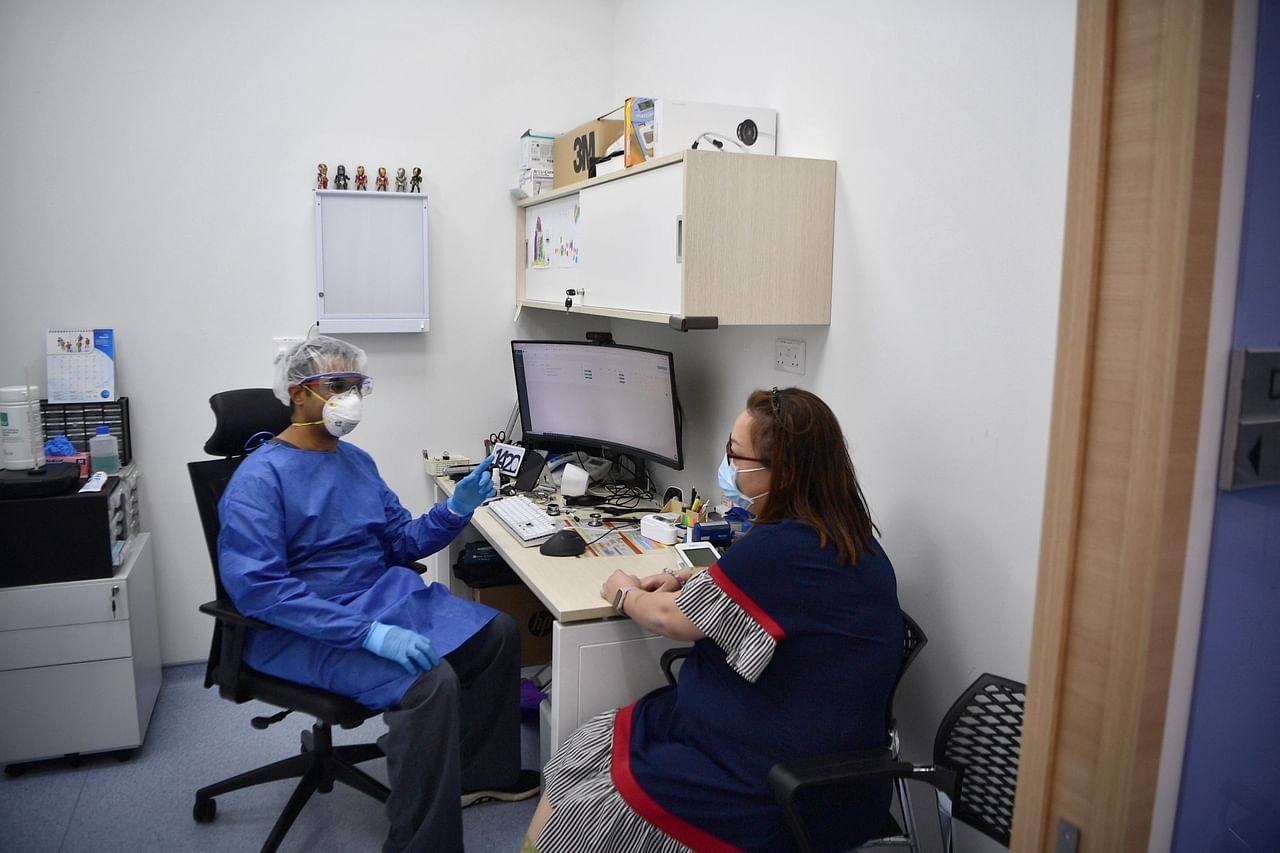SINGAPORE - Front-line doctors have been working longer hours and taking precautions as their number of patients rises along with Covid-19 community cases.
Dr Aziz Noordin, a family physician at Tampines Family Medicine Clinic, said that over the last few weeks, his clinic has seen a "significant increase" in patients, both asymptomatic and symptomatic. There has been a 50 to 80 per cent increase in those who have symptoms of upper respiratory tract infection, as well as asymptomatic patients coming forward to be tested for Covid-19.
Most of the people in the asymptomatic group are those who have received a health-risk warning, he added.
Dr Aziz said that in order to cope with the crowd, his clinic has encouraged patients to make an appointment before visiting.
But many patients who have received a health risk warning are concerned and still try to get tested without an appointment, he said.
Nevertheless, even if some people show up without prior notice, the clinic tries its best to accommodate them, he added.
"We do our best not to turn away unwell patients," he said. Sometimes this means everyone has to work longer hours if there is a backlog of patients, said Dr Aziz, adding that he tries to avoid the longer hours for his staff to prevent them from being burnt out.
He has asked some patients who have chronic but stable conditions to defer their appointments to prevent the clinic from being overwhelmed.
Meanwhile, Dr Dale Lim, a family physician at the Tenteram Clinic in Whampoa, said that he has seen an increase of about 20 per cent in patient numbers at his clinic as compared with the numbers before August.
While some of these were patients with symptoms of acute respiratory infection, another main source of patients has been seniors looking to get their booster shots, as his clinic offers the Pfizer-BioNTech mRNA vaccine under the national vaccination programme.
In order to cope, Dr Lim and his staff often have to extend their clinic operating hours to 10pm, one hour after their usual closing time.
Even after the clinic closes, Dr Lim continues to provide teleconsultations to manage patients recovering at home under the Home Recovery Programme.

Over at Intemedical 24 Hour Clinic in Ang Mo Kio, the number of patients has gone up around 30 per cent, with those who have upper respiratory tract infections, as well as those with Covid-19 making up the bulk of the surge.
Dr Raymond Ong, the clinic's managing director, said that he and his staff have been working extra shifts to try and cope with the load.
Dr Tan Teck Jack, chief executive of Northeast Medical Group, said that the increase in community cases has led to space and manpower constraints at the primary care level.
His group's clinics have seen an increase of about 20 to 30 per cent in patients as compared with earlier this year.
"The steps we have to take for each patient are now more complex - from screening and registration to dealing with swabs and IT systems. We need to do a lot more; hence, it takes longer to process each patient," he added.
However, additional manpower has been difficult to find as the healthcare community is currently stretched, said Dr Tan.
So he and his staff have no choice but to work at a more intense pace, and also stay back for an extra hour or so each shift to deal with the increased load.
Others have to take home paperwork to complete, he said.
The doctors said they and their staff have been taking various precautions such as wearing full personal protective equipment (PPE), keeping to a small social circle, and carrying out regular self-testing.
Asked what is being done to keep front-line doctors safe during the recent surge in cases, a spokesman for the Singapore Medical Association said that the Ministry of Health has been providing logistical support, such as PPE, to protect doctors and their staff.
Clinics under the Public Health Preparedness Clinic (PHPC) scheme also received training before the pandemic hit to help prepare them to perform their roles during public health emergencies.
"MOH has continued to advise doctors including those in PHPCs on healthcare requirements in our current pandemic situation and the plan for Singapore as it enters the endemic stage," said the spokesman.
Dr Aziz said that the new, streamlined set of procedures for those who are unwell, announced over the weekend by the multi-ministry task force, has helped lighten the load a little.
"The change in testing protocols helps us direct resources so we can focus on the unwell, and also look after other patients with chronic conditions which need managing," he said.
Dr Lim agreed. He added: "To further ease the strain, it will be good to have additional manpower to care for the higher number of patients infected with Covid-19 who have to recover at home."
Dr Tan encouraged people in the population to look after their health and remain well as much as possible, as this would help ease the strain on front-liners.
One simple way to do this is to maintain good personal hygiene and avoid crowded areas, said Dr Tan.
"It's time to go back to basics and keep healthy," he said.












